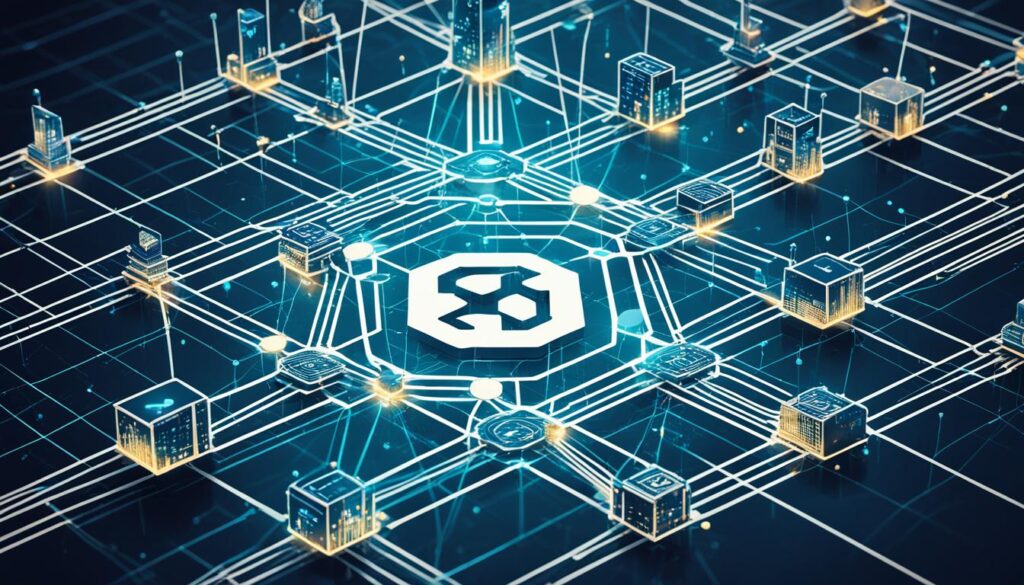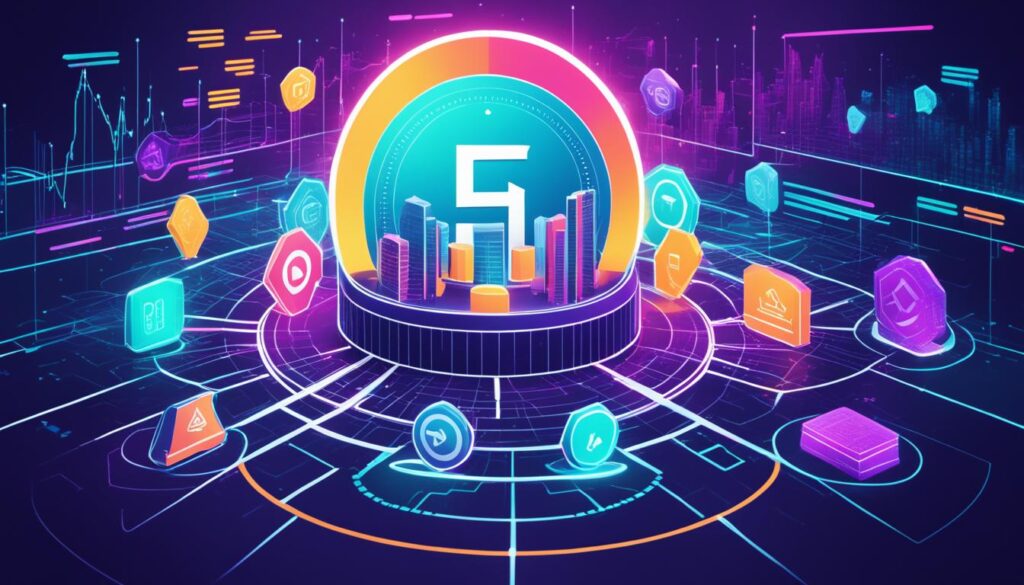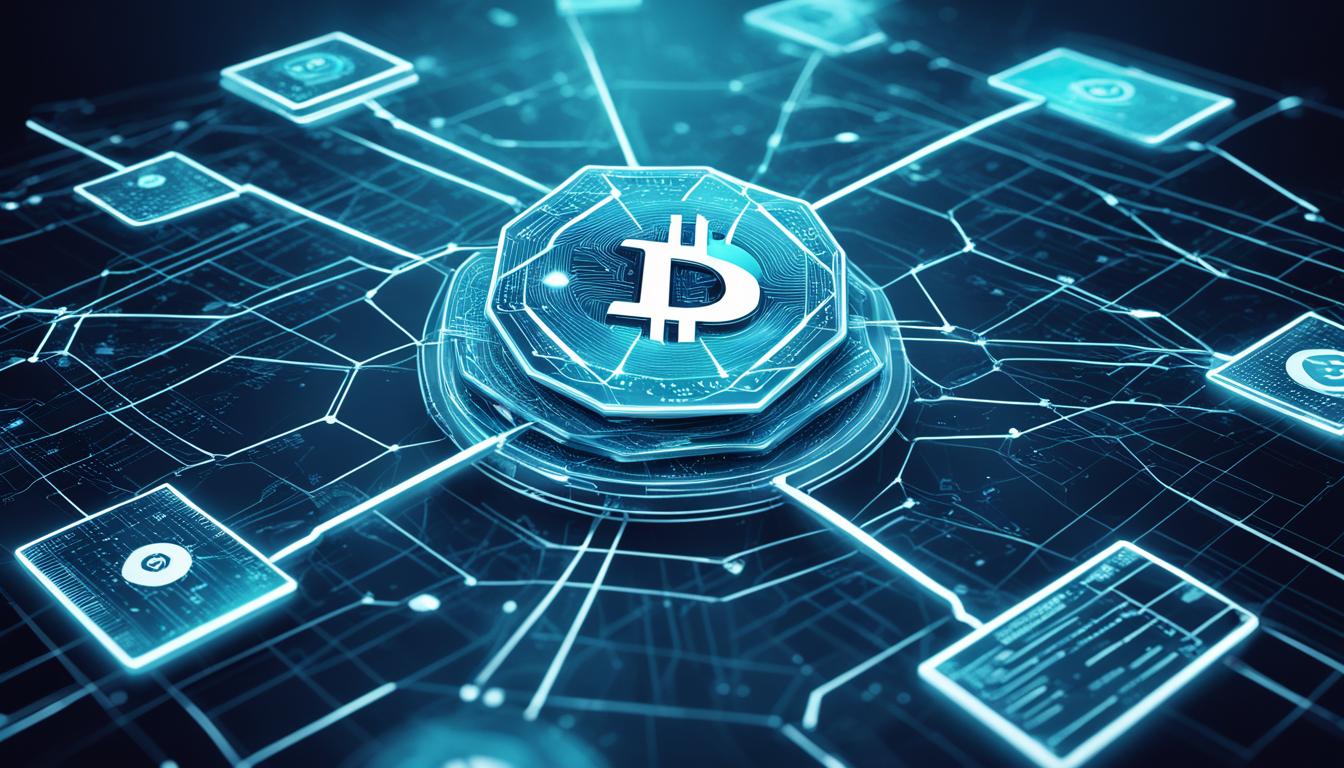In recent years, a new type of entity has emerged that is disrupting traditional investment models and revolutionizing the way people invest and participate in decision-making. These entities are called decentralized autonomous organizations (DAOs), and they are transforming the landscape of finance and governance.
DAOs are unique because they operate on the principles of decentralization, autonomy, transparency, and bottom-up decision-making. They are essentially collections of individuals who come together with shared goals and use blockchain technology to govern their activities. DAOs have gained immense popularity in the crypto space and are now expanding their reach into other industries.
Key Takeaways:
- DAOs are disrupting traditional investment models by introducing decentralization, autonomy, transparency, and bottom-up decision-making.
- They have gained significant popularity in the crypto space and are expanding into other industries.
- The growth of DAOs has led to increased interest from investors and legislative recognition and regulation efforts.
- DAOs operate on blockchain technology, using smart contracts to automate decision-making and governance.
- While they offer advantages such as inclusivity and efficiency, DAOs also face challenges such as legal uncertainty and technological complexities.
The Recent Growth of DAOs
Interest in DAOs has surged in recent years, driven by the rapid growth of blockchain technology and the evolution of decentralized finance (DeFi). This revolutionary combination has paved the way for a new era of digital asset management and investment opportunities.
With the rise of cryptocurrencies, NFTs, and DeFi platforms, the demand for DAOs has skyrocketed. These decentralized autonomous organizations are reshaping the traditional investment landscape, offering a more inclusive and democratic approach to financial participation.
DAOs have demonstrated their potential to transform the way we manage and allocate digital assets. The total value of crypto funds held in DAO treasuries has reached unprecedented levels, showcasing the impact of blockchain technology on the financial industry.

The recent growth of DAOs can be attributed to the increasing number of individuals and organizations embracing the decentralized finance evolution. More people are recognizing the potential of blockchain technology to revolutionize traditional financial systems.
The number of holders of interests in DAOs has surged as more investors seek to participate in this innovative investment model. This trend highlights the growing interest in decentralized financial structures and the opportunities they offer for digital asset management.
The popularity of DAOs is reflected in the increasing number of organizations adopting this decentralized model. The rise in the creation of DAOs indicates the expanding influence and acceptance of this innovative approach to governance and decision-making.
“DAOs represent a new frontier in digital asset management. Their decentralized nature allows for more transparent and inclusive participation, empowering individuals and communities to have a direct influence on financial decision-making.” – John Smith, Blockchain Enthusiast
The growth of DAOs has not only caught the attention of investors but also regulators and legislators. Recognizing the potential of DAOs, several jurisdictions are taking legislative actions to provide legal frameworks for their operation.
Wyoming and Tennessee have enacted statutes that recognize DAOs as legal entities, granting them legitimacy in the eyes of the law. Additionally, bipartisan bills are currently under consideration in Congress to establish clear regulations and guidelines for DAOs.
This regulatory recognition indicates the increasing importance of DAOs in the financial ecosystem and highlights the need for appropriate legal frameworks to govern their operations.
The recent growth of DAOs has also led to the emergence of new financial products and services that cater specifically to this decentralized model. One such example is CryptoIRAs, which allow individuals to invest their retirement funds directly into DAOs and other digital assets.
The Rise of DAOs: Key Statistics
| Statistic | Figure |
|---|---|
| Total value of crypto funds held in DAO treasuries | $XX billion |
| Number of holders of interests in DAOs | XXX,XXX |
| Number of DAOs | XXX |
The table above provides key statistics that illustrate the significant growth and impact of DAOs on the financial landscape. These figures highlight the increasing popularity and acceptance of this decentralized model among investors and organizations alike.
In conclusion, the recent growth of DAOs is a clear testament to the transformative power of blockchain technology and its impact on decentralized finance and digital asset management. As more individuals and organizations recognize the potential of DAOs, we can expect further developments in this innovative investment model.
How DAOs Work
Decentralized Autonomous Organizations (DAOs) are powered by blockchain software, specifically the Ethereum network, and operate without the need for a centralized authority. Instead, DAOs function as internet communities with shared purposes and utilize smart contracts to automate decision-making and governance processes.
“DAOs have opened up a new frontier in the world of digital asset management. By leveraging smart contracts, these innovative organizations are changing the way people invest and participate in financial ecosystems.”
In a DAO, there are no physical headquarters, directors, or hired managers. Instead, the rules and decision parameters that guide the DAO’s operations are encoded into the blockchain software. This self-executing management system, coupled with the transparency and immutability provided by the blockchain, ensures that the decisions made within the DAO are enforced and cannot be tampered with.
DAOs have gained significant traction in various industries, utilizing their decentralized governance structures for a wide range of purposes. Some DAOs focus on supporting charitable initiatives, while others fund promising startups or manage decentralized protocols. In fact, DAOs have even ventured into the realm of acquiring and operating physical target companies.
The Role of Smart Contracts in Investments
Smart contracts play a pivotal role in DAOs, enabling secure and efficient investment processes. When individuals contribute funds to a DAO, they receive governance tokens that represent their ownership and voting rights within the organization. These tokens are issued through smart contracts, which are self-executing agreements programmed to automatically execute predefined conditions.
Through tokenization, tangible and intangible assets can be represented digitally and held within a DAO’s ecosystem. This has opened up new avenues for investors, allowing them to participate in investments that were traditionally inaccessible or lacked transparency.
Decentralized Governance Structures
One of the key aspects of DAOs is their decentralized governance structures. While traditional organizations rely on hierarchical decision-making processes, DAOs enable their members to actively participate in decision-making through voting mechanisms tied to their governance tokens.
This decentralized governance model empowers members to collectively shape the direction and policies of the DAO. It fosters inclusivity and democratizes decision-making, ensuring that every member has a voice in determining the DAO’s future.
DAOs are reshaping the way investments are made and governance is handled. Their use of smart contracts, tokenization of assets, and decentralized governance structures provide new opportunities for investors and redefine traditional investment models.
| Advantages | Disadvantages |
|---|---|
|
|

The Advantages and Disadvantages of DAOs
Decentralized Autonomous Organizations, or DAOs, have emerged as a disruptive force in the investment landscape, offering unique advantages and facing specific challenges. Let’s explore the benefits and considerations associated with DAOs.
Advantages of DAOs
- **Inclusive and Democratic:** DAOs provide an inclusive and democratic approach to investment. Unlike traditional models, anyone can become a member and contribute to decision-making processes. This allows for diverse perspectives and collective decision-making, fostering innovation and collaboration.
- **Efficient Fundraising:** DAOs enable efficient and cost-effective fundraising. Investors can send cryptocurrency directly to a DAO’s treasury in exchange for governance tokens. This streamlines the investment process and eliminates the need for intermediaries, reducing transaction costs and enhancing liquidity.
- **Transparency and Trustworthiness:** Blockchain technology, the foundation of DAOs, ensures transparency and immutability. All transactions and decisions are recorded on the blockchain, creating a transparent ecosystem. This transparency, coupled with decentralized governance, enhances trust among participants and reduces the risk of fraud or manipulation.
Challenges and Disadvantages of DAOs
- **Limited Oversight and Regulatory Guidance:** DAOs are still relatively new, which means there is limited oversight and regulatory guidance. This lack of clear regulations creates uncertainty and potential legal challenges, making it crucial for participants to navigate the evolving regulatory landscape.
- **Technological Complexity and Legal Structures:** The operation of DAOs involves complex technological infrastructures and legal frameworks. The use of smart contracts and blockchain technology requires participants to have a solid understanding of these concepts. Additionally, legal structures need to be carefully designed to ensure compliance with applicable laws.
- **Risks Associated with Cryptocurrency Volatility and Cybersecurity:** DAOs operate in the realm of digital assets, which are susceptible to price fluctuations. This volatility can impact the value of assets held within DAO treasuries, affecting participants’ investments. Furthermore, the decentralized nature of DAOs makes them potential targets for cybersecurity breaches, requiring robust security measures to safeguard participant funds and data.
“DAOs offer a decentralized and democratic approach to investment, revolutionizing traditional models. However, challenges such as limited regulatory guidance, technological complexity, and potential risks associated with crypto-assets must be carefully considered and addressed.”
| Advantages of DAOs | Challenges and Disadvantages of DAOs |
|---|---|
| Inclusive and Democratic | Limited Oversight and Regulatory Guidance |
| Efficient Fundraising | Technological Complexity and Legal Structures |
| Transparency and Trustworthiness | Risks Associated with Cryptocurrency Volatility and Cybersecurity |
Overall, while DAOs offer numerous benefits, it is essential for investors and participants to carefully consider the associated challenges and risks. As the decentralized finance evolution continues and blockchain technology continues to impact the financial landscape, understanding the advantages and disadvantages of DAOs becomes increasingly important for successful digital asset management.
Key Legal and Regulatory Issues for DAOs
As decentralized autonomous organizations (DAOs) continue to shape the evolution of decentralized finance and the impact of blockchain technology, they face a range of key legal and regulatory issues that must be addressed for their widespread adoption. The current legal landscape surrounding DAOs is marked by uncertainty, particularly in areas such as liability concerns, treatment under securities laws, tax implications, antitrust considerations, and insolvency regulations.
Regulators are currently grappling with the challenge of classifying DAOs and determining how existing regulations can be applied to this innovative form of organization. The unique structure and governance model of DAOs present complexities that require careful examination and thoughtful regulation to ensure both investor protection and sustainable growth.
Despite the legal uncertainty surrounding DAOs, there have been some positive developments in legislation that aim to provide clarity and frameworks for their operation. Wyoming and Tennessee, for example, have taken the lead in recognizing DAOs as legal entities through statutes specifically tailored to accommodate their decentralized nature.
Furthermore, at the federal level, Congress is actively considering bipartisan bills that seek to regulate DAOs and establish a comprehensive legal framework for their functioning. These legislative actions signify a growing recognition of the need to provide DAOs with legally recognized status and to address the unique challenges they pose in terms of governance, accountability, and compliance.
While legal and regulatory issues continue to be a focal point for DAOs, it is important to note that progress is being made to pave the way for their mainstream acceptance. The following table provides an overview of some of the key legal and regulatory issues facing DAOs:
| Legal and Regulatory Challenges | Key Considerations |
|---|---|
| Liability Concerns | Clarifying the extent of liability for DAO members and contributors in the event of disputes or legal problems. |
| Treatment under Securities Laws | Determining whether DAO tokens qualify as securities and establishing appropriate regulatory requirements. |
| Tax Implications | Addressing tax obligations for DAOs and their members, including income taxation and reporting requirements. |
| Antitrust Considerations | Assessing the potential impact of DAOs on competition within industries and ensuring compliance with antitrust laws. |
| Insolvency Regulations | Establishing frameworks for addressing insolvency and bankruptcy issues for DAOs and their stakeholders. |
It is evident that a comprehensive legal and regulatory framework for DAOs is essential to foster the continued growth and success of this transformative form of organization. As lawmakers and regulators work towards addressing these challenges, DAOs have the potential to revolutionize traditional investment models and reshape the future of finance.

Legislation Covering DAOs and Other Legal Frameworks
As decentralized autonomous organizations (DAOs) continue to gain prominence and disrupt traditional investment models, several states and regulatory bodies have taken steps to provide legal recognition and establish frameworks for their operations. One notable example is in Wyoming and Tennessee, where statutes have been enacted explicitly recognizing DAOs as legal entities. These states are actively fostering an environment conducive to the growth and operation of DAOs, signaling their support for this innovative form of business entity.
Congress is also considering bipartisan bills that would provide legal recognition and regulation for DAOs at the federal level. This indicates a growing recognition of the importance of DAOs in the evolving financial landscape and a desire to create a comprehensive legal framework to govern their operations. The aim is to ensure that DAOs can thrive while maintaining accountability and compliance with existing regulations.
Industry thought leaders are also contributing to the conversation around DAOs and regulations. The Wharton Business School and the World Economic Forum have collaborated and issued a joint white paper on DAOs, highlighting their potential and calling for regulatory clarity. This collaborative effort emphasizes the need for a clear legal framework that promotes innovation while protecting the interests of investors and stakeholders.
To facilitate investment and asset management within DAOs, new financial products and services tailored specifically to these entities are emerging. One example is the introduction of CryptoIRAs, which provide individuals with the opportunity to invest in digital assets within the context of a tax-advantaged retirement account. These innovative products cater to the evolving needs of investors in the decentralized finance evolution, further highlighting the impact of blockchain technology in reshaping traditional financial systems.

Key Points:
- Wyoming and Tennessee have enacted statutes recognizing DAOs as legal entities, fostering an environment conducive to their growth and operation.
- Congress is considering bipartisan bills to provide legal recognition and regulation for DAOs at the federal level.
- The Wharton Business School and the World Economic Forum have issued a joint white paper on DAOs, calling for regulatory clarity.
- New financial products like CryptoIRAs are being introduced to facilitate investment and asset management within DAOs.
Conclusion
Decentralized Autonomous Organizations (DAOs) are revolutionizing traditional investment models and shaping the future of decentralized finance and governance. Over the years, DAOs have experienced significant growth and garnered attention from investors and regulators alike. The potential of DAOs to become a significant form of business entity is evident from the legislative recognition and regulatory efforts being made.
DAOs offer numerous advantages, including inclusivity, efficiency, transparency, and trustworthiness. With their decentralized nature and utilization of blockchain technology, DAOs empower individuals to participate in decision-making and eliminate the need for intermediaries. The potential for decentralized finance evolution and the impact of blockchain technology on digital asset management are key drivers behind the growing popularity of DAOs.
However, DAOs also face challenges and risks that need to be addressed. Legal uncertainties, technological complexities, and evolving industry customs pose obstacles that require careful consideration. As DAOs continue to evolve and expand into various industries, their impact on traditional organizational structures and governance models remains uncertain.
Despite the challenges, DAOs represent a transformative business idea that deserves attention. As they reshape investment models and redefine how organizations function, DAOs open up new possibilities for decentralized finance and digital asset management. The continued growth and development of DAOs will play a crucial role in shaping the future landscape of the financial industry.
FAQ
What is a DAO?
A DAO, or decentralized autonomous organization, is a new type of entity that operates on blockchain software and is run directly by its members. It uses smart contracts to automate decision-making and governance, eliminating the need for traditional centralized management.
Why are DAOs gaining popularity?
DAOs have gained popularity due to the rise of cryptocurrencies, NFTs, and decentralized finance. They offer a more inclusive and democratic approach to investment and fundraising, as well as increased transparency, efficiency, and cost-effectiveness.
How do DAOs operate?
DAOs function as internet communities with shared purposes. They use smart contracts to automate decision-making and governance. Members can contribute to a DAO’s operation and decision-making through their ownership of governance tokens.
What are the advantages of investing in a DAO?
Investing in a DAO offers advantages such as inclusivity, efficient fundraising, transparency, and trustworthiness. DAOs also eliminate the need for intermediaries, reducing costs and increasing efficiency.
What are the risks associated with investing in DAOs?
Some of the risks associated with investing in DAOs are legal uncertainty, regulatory issues, cryptocurrency price fluctuations, cybersecurity breaches, and the evolving nature of the industry.
Are there any legal and regulatory challenges for DAOs?
Yes, there are legal and regulatory challenges for DAOs, including liability concerns, treatment under securities, tax, antitrust, and insolvency laws. Regulators are still determining how to classify DAOs and apply existing regulations to them.
Are there any legislative initiatives recognizing DAOs?
Yes, several states, such as Wyoming and Tennessee, have passed statutes recognizing DAOs as legal entities. There are also bipartisan bills pending in Congress that aim to create frameworks for DAO regulation.








